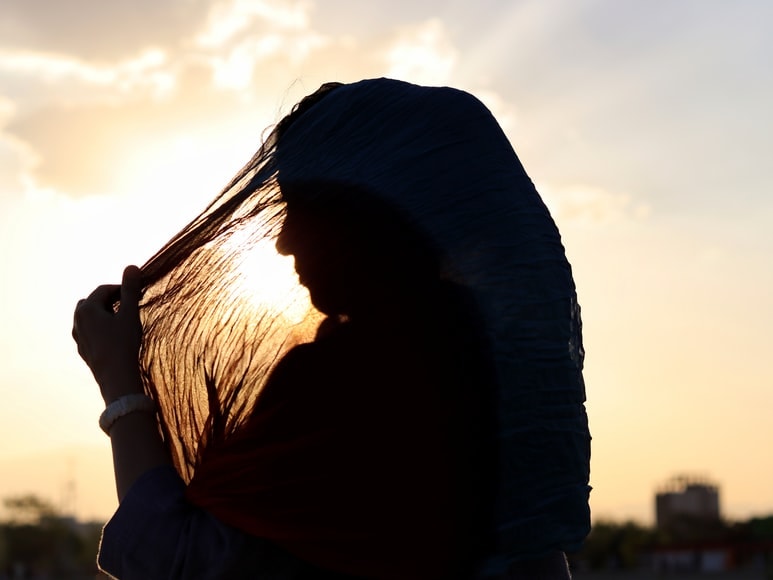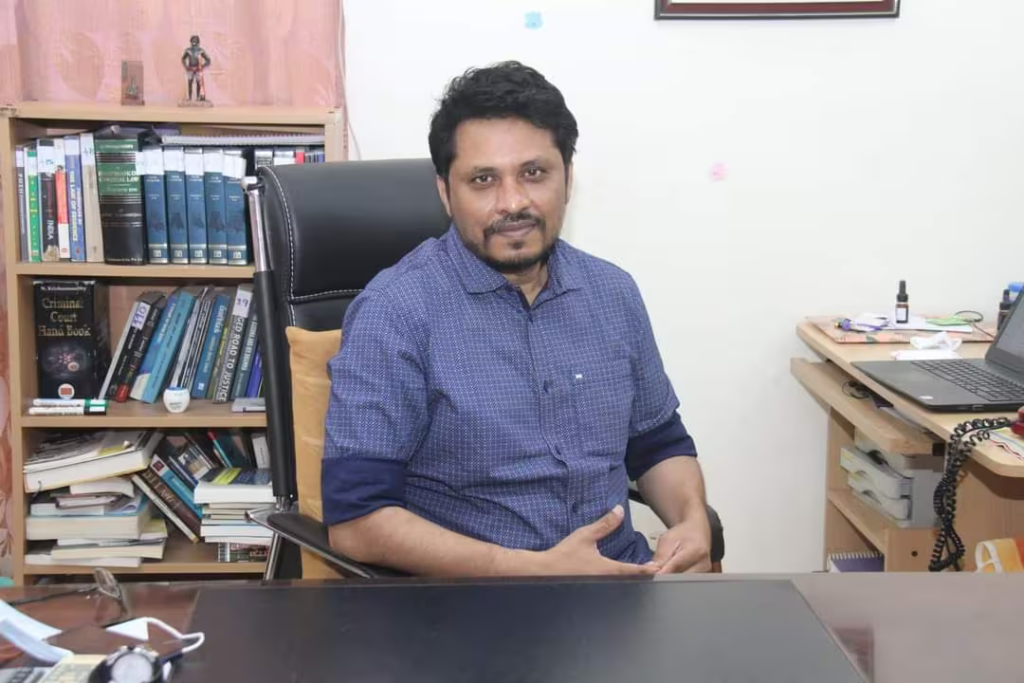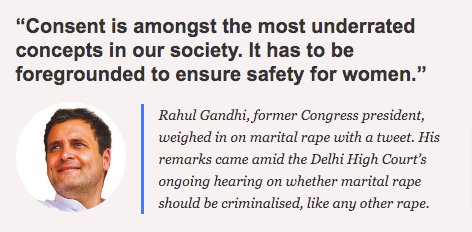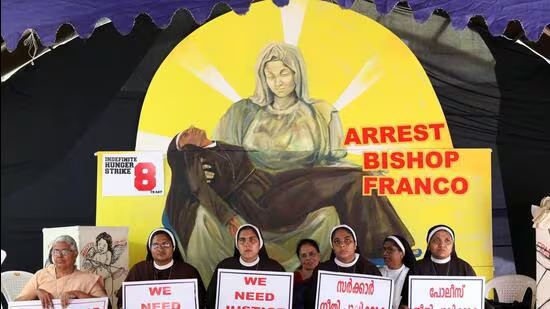Six students have continued to be marked absent since December 31 after being denied entry into their classrooms at the Government Women’s pre-university college in Udupi, Karnataka for their insistence on wearing a hijab.
College principal Rudra Gowda has said the students can wear hijab on the college premises but not inside classrooms. The rule is being followed to ensure uniformity in the classroom, he said.

What the girls want
“We are not allowed to go inside the classroom,” said Aliya Assadi, one of the six students. “One day, we had gone inside the classroom, but the teacher’s response was, ‘If you don’t go out of the class, I will push you out’.”
The students have been sitting outside the classroom, in the college corridors and on the stairs, with their books and bags.
The girls say their choice to wear a hijab is in conformity with their fundamental and constitutional rights. They point out that other students are allowed to wear religious markers like a bindi.
They see communal discrimination by the college as they say they are not allowed to speak in Urdu or say salaam to each other.
But they also worry that their continued absence from classes denies them a right to learn and could lead to a shortfall of attendance requirements for the examinations.
Escalating row
Karnataka’s education minister BC Nagesh has, however, dismissed the controversy as ‘politically motivated’. He said that there were close to 100 Muslim students at the institute but, barring the six, none had insisted on their right to wear hijab.
Some newspapers are reporting that in response to the hijab row, students at two other colleges, a government-run institute in Chikmagalur and Pompei College, Mangaluru, have begun sporting saffron scarves around the necks.
The controversy comes on the heels of continuing online auctions of prominent and outspoken Muslim women that have left an increasing number feeling under siege for the practice of their faith.
It also coincides with an increasing number of women students opting for higher education. The All India Survey on Higher Education 2019-2020 shows an 18% increase over five years in the enrolment rate of women in post-graduate programmes. A nation-wide survey of 74,000 teenage girls by Naandi Foundation found high levels of aspiration, with 70% of girls saying they wanted to pursue higher education and another 74% wanting to work after completing their studies.
On January 19, a meeting was organised between school management, government officials and the students but could not reach a conclusion.
Two days later, a note signed by the principal said the college would be shut for five days until January 26, ostensibly because six students had tested positive for coronavirus.
GOING PLACES

Vincent Raj Arokiasamy, better known as Kathir, founder of Evidence, an organisation that works towards the effective implementation of laws and policies to protect and promote Dalit and tribal rights has been awarded the Council of Europe’s Raoul Wallenberg prize. With a cash component of 10,000 euros, the prize is awarded once every two years in “recognition of extraordinary achievements”. In its citation, the Council commends Kathir for his “enormous courage” in rescuing 25,000 victims in over 3,000 cases of human rights violations
Gender Tracker
147,492 are the number of children who have lost at least one parent due to Covid between April 1, 2020 and January 11 this year. Of these, 70,980. are girls and four are transgender
Source: National Commission for Protection of Child Rights
Quote/Unquote

WATCH

Is there anything that Nadia Nadim can’t do? The 32-year-old Afghanistan born player has played for Denmark, Manchester City, Paris Saint-Germain and in the US National Women’s soccer league. She speaks nine languages. She was UNESCO’s 2019 Champion for Girls and Women’s education.
On January 14, the 11-year-old who had to flee Afghanistan in 2000, travelling thousands of miles to Denmark in a truck after her father, an armyman, was executed by the Taliban, added a new feather to her cap as she qualified as a reconstructive surgeon. She tweeted: “MAMA, I MADE IT!!!! Doctor Nadim in the house.”
Watch the Pride of Denmark here
STORIES YOU MIGHT HAVE MISSED
Marital rape update
A two-judge bench of the Delhi High Court continued its hearing on petitions seeking to remove the legal ‘exception’ to India’s rape law—non-consensual sex with a spouse if she’s over 15-years-old is not rape. Amicus curie, or friend of the court, Rebecca John called the exception an “instrument of oppression of married women” and argued for it to be struck down. Expectation of sexual relations cannot lead to a husband having forcible sex with his wife, she told the court.
Outside the court, police in Indore arrested five men, including the husband of a 32-year-old woman, for gang-raping her, keeping her confined and torturing her with cigarette butts. The woman said she was raped by her husband and his friends. Under existing law, the husband who apparently instigated the crime, cannot be charged with raping his wife.
Elsewhere on social media, several men’s rights groups, including the Save Indian Family Foundation, went on a ‘marriage strike’ to protest against the possible criminalisation of marital rape. Feminists welcomed the strike, saying men who didn’t understand consent shouldn’t be getting married at all.
Muslim women targeted, again

Even as police made its fifth arrest, Neeraj Singh from Odisha, and the courts continued to deny bail to those involved in the reprehensible online ‘auction’ of Muslim women, there are reports of yet another live chat on ClubHouse with men, and women, commenting on and auctioning off parts of women’s bodies, including their breasts and vaginas. Sexually assaulting a Muslim woman is the equivalent of building seven temples, one participant can be heard saying on the invitation-only app.
Swati Maliwal, the head of the Delhi Commission for Women, issued a notice to the Delhi police cyber crime cell. An FIR (first information report) has been lodged. Mumbai police in the meanwhile, have made three arrests relating to the ClubHouse chat.
Dear Sister X

The acquittal of Franco Mulakkal, a former bishop of Jalandhar diocese, of charges of rape has triggered outrage in support of the nun who has accused him of raping her 13 times between 2014 and 2016. It has led to a letter-writing spree by feminists, activists, journalists, film-makers and singers addressed to ‘Sister X’. Pledging support for her “fight for justice”, the letters are being posted on social media. “There will be light at the end of this really dark tunnel,” wrote singer Chinmayi Sripada, a prominent voice in India’s #MeToo movement.
FIELD NOTES
How women benefit from indoor piped water
With water on tap still a pipe dream for many households in India, the burden of fetching water falls disproportionately on women. A paper by Ashish Sedai published in Ideas for India uses 2005-2012 data from the India Human Development Survey to show how household access to indoor piped drinking water reduces gender differences in rural employment in farm and non-farm work.
But the lack of piped water in homes also poses greater risk to health from water-borne diseases. When family members fall ill due to drinking water from contaminated open sources such as community wells and hand pumps, the burden of caring for them also falls on women.
There is a serious lack of drinking water infrastructure in households. While access to piped drinking water in rural India improved from 16% in 2005 to 21% in 2012, it fell in urban areas from 51% in 2005 to 50% in 2012. Most districts, regardless of state, receive water supply at home for only one to seven hours a day.
Time saved from not having to trek to open sources of water outside the home as well as not having to care for family members who fall ill from drinking this water, will enable greater workforce participation by women.
Read the paper here.
AROUND THE WORLD
In the US, first Muslim woman federal judge

If confirmed, Nusrat Jahan Choudhury, a Bangladeshi-American, could become the first Muslim woman, and the second Muslim (after Zahid Quraishi) who will serve as a federal judge in America. Seven of the eight judicial nominees announced in this round by President Joe Biden are women. Biden has nominated a total of 83 people as judges; 62 are women.
In South Korea, poll promise against gender equality

A leading candidate for South Korea’s presidential elections scheduled for March 6 says he will abolish the Ministry of Gender Equality and Family if voted to office. Yoon Suk-yeol of the conservative People Power Party said the functions of the key ministry will be subsumed by other ministries. Political commentators believe the announcement is to appease young men who feel discriminated against in the job market. South Korea ranks 108 out of 153 nations on the World Economic Forum’s gender gap report.
In Mexico’s Juarez, killing spree sparks protest

A brutal and ongoing killing spree in Juarez, Mexico has left 67 dead–11 of them women–this month alone. On January 16, the discovery of four women’s bodies in garbage bags dumped on the street has sparked protests. Two of the women are believed to have been in a same-sex relationship and activists believe they were targeted for their gender and sexual choices. Mexico’s National Commission to eradicate Violence Against Women has asked the government to hold accountable those responsible for the killings.
Before I go…
You may like to read Hindustan Times five-part series on the impact of children of school closures due to the Coronavirus pandemic.
Part 1: Debabrata Mohanty reports on how Kandhamal’s learning gap is being exacerbated amid another wave.
Part 2: Joydeep Thakur on how the spectre of child marriage and trafficking looms large in Sunderbans.
Part 3: Ashni Dhaor on the shattering of aspirations for private ‘English medium’ schools.
Part 4: Fareeha Iftikhar examines how the digital divide is leaving out the children of migrants.
Part 5: Ritesh Mishra reports on the fear that school shutdowns could boost Maoist recruitment.
That’s it for this week. If you have a tip or information on gender-related developments that you would like to share, write to me at: namita.bhandare@gmail.com.
Were you forwarded this email? Did you stumble upon it online? Sign up here.
Written by Namita Bhandare. Produced by Nirmalya Dutta.



